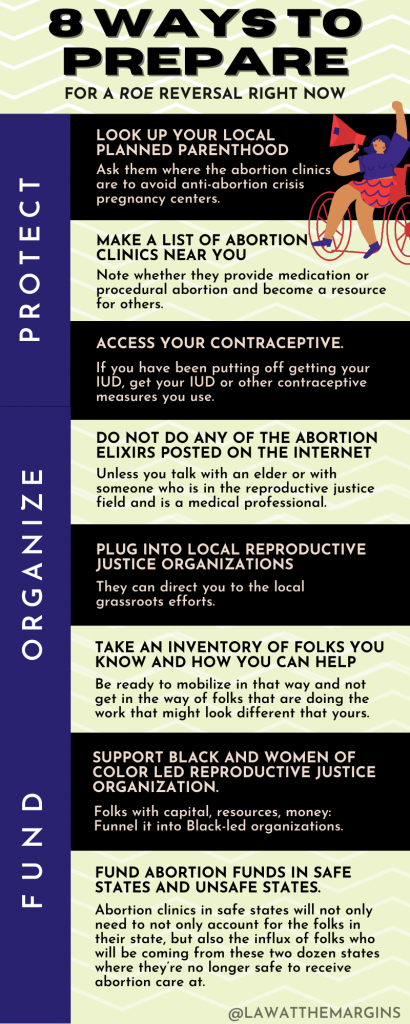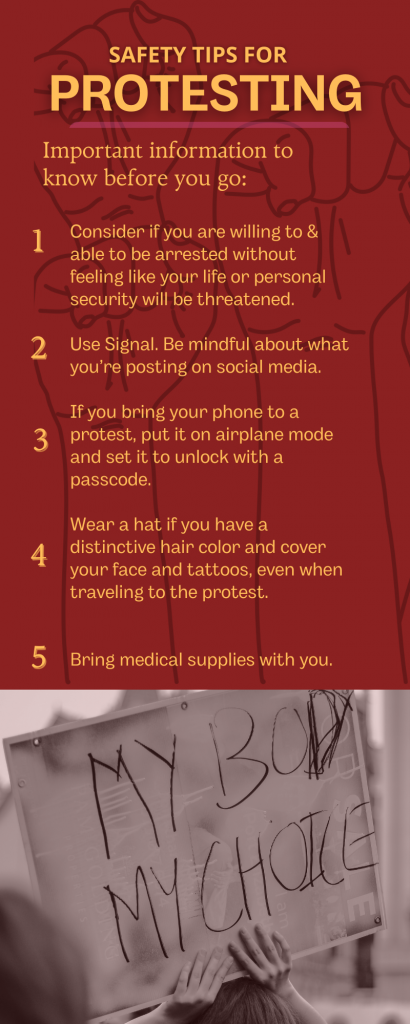While the leaked Supreme Court (SCOTUS) draft decision striking down Roe v. Wade has sent many of us reeling, media on the topic has confused many about the present and future of abortion rights in the United States. While abortion is still very much legal, if Roe is overturned, 23 states have laws in place that will severely limit abortion access and 12 have “trigger bans” that would automatically enact total bans. Conservative legislators have also expressed that a national abortion ban is possible if Roe is overturned, and much more than abortion rights may be effected by this decision. Additionally, despite the threat of Roe’s reversal, the U.S. senate has continued to fail to pass the Women’s Health Protection Act, which would codify Roe’s protections. While there is no sure-fire way for us to know what SCOTUS’s official decision will be, reproductive justice advocates have been adamant that the time to prepare for the potential reversal of Roe is now.

What is Dobbs v. Jackson Women’s Health Organization and Why Does it Matter?
In 2018, Mississippi passed a law called the “Gestational Age Act” which prohibited abortions after 15 weeks in noncompliance with, as well as a direct challenge to Roe. Morgan N. Moone, MPH, J.D., Strategic Data and Advocacy Manager at Reproductive Justice Action Collective (ReJAC), a reproductive justice organization based in New Orleans, explains that This Mississippi Gestational Age Act, was one of many such laws that were “ put through with the sole purpose of overturning Roe…This has all been a strategy. Our legislatures have been putting forth blatantly unconstitutional bills in the state legislature…” in order to chip away at Roe.
The leaked draft decision in Dobbs v. Jackson Women’s Health Organization as reported by Politico is a “a full-throated, unflinching repudiation of the 1973 decision which guaranteed federal constitutional protections of abortion rights”. Moone explains that the opinion is “scathing, it is very clearly written with years of pent-up resentment towards the Roe case. It basically strips the right of abortion from an individual simply because it was not a historical right that was found in the Constitution.” If the leaked opinion is in fact the Court’s decision. Moone continues, “Roe is going to be overturned and it’s no longer going to be the law of the land,” removing federal protections to abortion access.

Particularly, the overturning of Roe would disproportionately effect marginalized populations which makes this decision a thinly veiled attack on Black, Brown, Indigenous People of Color (BBIPOC) with uteruses. Black women would be especially harmed by this decision, but South Asian, Latinx, and Indigenous communities would also be effected.
As explained by South Asian SOAR, a nonprofit whose mission is to grow survivor and collective power to transform the culture and systems that lead to violence, “the reversal of Roe v Wade would have a devastating impact on South Asian families and communities — especially on survivors, immigrants, queer and trans people, and working class people. In this moment, we look to the South Asian, Muslim, Indo-Caribbean, and BIPOC leaders at the forefront of the reproductive justice movement as we fight not only to protect Roe v. Wade, but also reimagine the future of reproductive justice and freedom for all.” You can read their recent statement on this here.
What does the Leaked Opinion Say and What are its implications?
While the leak itself is unprecedented, it is the content of the drafted decision that has mobilized reproductive rights protesters over the potential reversing of Roe by SCOTUS. The draft, written by George W Bush nominated Justice Samuel Alito, unequivocally holds that Roe, and the subsequent 1992 decision Planned Parenthood v. Casey, be overturned. “Roe was egregiously wrong from the start,” Alito writes in the opinion.
If Roe is overturned, the right to an abortion is a question which will go back to the states, which will mean that the effects of the Dobbs decision will be felt differently state by state and even county by county. In Louisiana, there is both a trigger ban and a constitutional amendment that denies the right to abortion in the state. The country will be divided into ‘safe’ and ‘unsafe’ states where ‘safe’ states provide ample access to safe abortions and ‘unsafe’ states limit access to and even criminalize people who need abortions or even those who help people access (“aid and abet”) abortions. In addition to the draft overruling Roe and Casey, Alito also includes that “a right to abortion is not deeply rooted in the Nation’s history and traditions,” which could implicate other SCOTUS cases that rest on the “right to privacy” which is not distinctly stated in the Constitution.
As explained by Moone, “[The leaked opinion] is talking about the right to privacy. [We are looking at the potential implication of losing the right to contraception, or certain types of contraception, losing rights to marriage, losing rights to interracial marriage and relationships, potentially seeing homophobic laws that have been on the books that outlaw same-sex marriage, same-sex interactions, anything, outlawed.”
Moone joins legal scholars like Nelson Tebbe, a law professor at Cornell Law School, and Noah Rosenblum, a law professor at New York University School of Law, who have been vocal about their concern that the reversal of Roe, especially because of the legal argument made in the draft opinion, could create a roadmap which could lead to the reversal of Obergefell v. Hodges, the case which legalized same-sex marriage nationally. Other advocates have voiced concern that other legal precedents, such as the right to interracial marriage and contraception, would also be in danger of being overturned.
Social Mobilization and Influencing the Leaked Decision
Since the opinion was leaked, protests have erupted across the country to voice outrage over the potential reversal of Roe. “I think that the leaked opinion has highlighted the disconnect between the Supreme Court and the lived reality of citizens,” Moone explains. If you are planning on joining the protests, Moone has a few tips to keep you and your community safe:
- Consider if you are willing and able to be arrested without feeling like your life will be threatened before joining a protest.
- Use Signal and be mindful about what you’re posting on social media, espeically TikTok trends that suggest an individual may be open to helping another obtain an abortion.
- If you bring your phone to a protest, put in on airplane mode and set it to unlock with a passcode.
- When going out to a protest—even when you are traveling to the protest—make sure that your face and tattoos are covered. If you have a distinctive hair color, wear a hat.
- Bring medical supplies with you.
What Can We Do Right Now to Protect Reproductive Rights?
While there is the potential for protest to shift public opinion and influence SCOTUS to change its decision, there are other steps that we can take to prepare for the potential reversing of Roe to protect ourselves and our communities and support grassroots organizations that are organizing for reproductive justice. Moone suggests that each of us start by doing the following:
- Look up your local Planned Parenthood and ask them where the abortion clinics are, especially if you are not skilled in identifying fake anti-abortion crisis pregnancy centers.
- Make a list of abortion clinics near you and whether they provide medication or procedural abortion.
- If you have been putting off getting your IUD, get your IUD.
- DO NOT do any of the abortion elixirs that they are posting on the internet, unless you talk with an experienced elder or with someone who is in the reproductive justice field and is a health professional.
- Get plugged into local reproductive justice organizations—they are going to be able to direct you to the local grassroots efforts and hopefully get you linked up.
- Take an inventory of folks that you know, an inventory of how you can help and be ready to mobilize in that way and not get in the way of folks that are doing the work in lanes that might look different from yours.
- Support Black and women of color led reproductive justice organizations, especially if you can direct resources to those organizations. Folks with capital, with the resources, with the money, to funnel that money into
- Fund abortion funds in safe states and unsafe states. Abortion clinics in safe states will not only need to not only account for the folks in their state, but also the influx of folks who will be coming from these two dozen states where they’re no longer safe to receive abortion care at.
What To Do from Here:
Abortion is currently still legal—as is same sex marriage and contraception like Plan B. If you need an abortion right now, in May of 2022, you can utilize resources like this to find an abortion clinic near you. Moone encourages people to continue to “Get your appointments, continue to get your abortions, connect with reproductive justice organizations, follow them on social media, don’t believe anything you read on the internet unless it’s from an actual reproductive justice organization or a clinic.” While there is a lot of fear and desperation in our communities right now, it is important for us to keep each other safe, connect with our local mutual aid groups and reproductive justice organizations, and give ourselves the space to anticipate and grieve.
“When we’re faced with a country that is willing to take the right to an autonomous, full, joyful life away from you, it’s heavy,” Moone explains, “No one know what’s going to happen. The important part is that we’re looking out for each other and we are taking care of the bodies that we are given…the second we start to give away the right to choose anything, abortion, not abortion, what have you, is the second that we start to give a very, very corrupt State even more power.”




